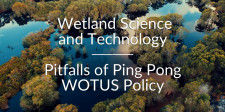
Environmental compliance platform leadership team brings together industry leaders in upcoming webinar episode; announces new Ecobot podcast.
ASHEVILLE, N.C., May 18, 2021 (Newswire.com) - Leading environmental regulatory experts will join together on May 19 for the webinar "Pitfalls of Ping Pong WOTUS Policy," hosted by Ecobot, to discuss the overhaul of the Waters of the United States (WOTUS) policy, pending changes by the Biden Administration, and the future of wetlands regulation.
Panelists appearing on this webinar include moderator, Jeremy Schewe, PWS, Chief Scientific Officer, Ecobot; Donna Downing, J.D., Senior Legal Policy Advisor, ASWM; Gordon Shaw, PWS, Senior Wetland Specialist, Burns & McDonnell; Minta Kay, J.D., Partner, Goodwin; Matthew Stahman, PWS, Director of Regulatory, RES; and Royal Gardner, J.D., Professor, Stetson University College of Law.
"Bringing together the leading minds in the industry is vital to the work we do in the industry. To make these vital conversations available to a wider audience, we are sharing all previous and future webinars through The Ecobot Podcast, starting this week," Schewe said.
Ecobot is an environmental compliance technology platform used by thousands of consultants to delineate wetlands for jurisdictional determination. More than 5,500 scientists, policymakers and others in the regulatory community have attended Ecobot webinars in the past year. Ecobot sees its new podcast, available on all podcast outlets, as a roadmap to a complicated and rapidly changing ecosystem of software, hardware, and policy issues.
Environmental regulations ebb and flow with the tides of political climate change. Legal battles ensue. Environmental consultants, regulatory enforcers, and developers are left to pick up the pieces. With recent rollbacks to rollbacks of WOTUS rules, Ecobot's next webinar will address how leading environmental regulators and consultants are responsibly tackling the turbid waters that impact the construction, utilities, and farming industries, as well as environmental organizations.
"The panelists for the webinar on May 19 will delve into great detail on policy changes, permitting, WOTUS, and what the landscape looks like under the Biden administration, and what that means moving forward. It's a constant challenge to try to stay on top of the changes in the regulations, so that we can advise our clients of the options available," Shaw said. "We inform clients what the guidance is now and draw on our experience with various USACE districts in an attempt to anticipate how regulations will be implemented, although it is often difficult to predict a timeline."
The webinar will address the following topics:
- Backdrop of evolution of WOTUS rules and CWA
- 2015 Clean Water Rule to 2020 Navigable Water Protection Rule changes
- "Proving" or justifying a stream being called ephemeral
- Temporary impacts permits for ephemerals streams
- Uptick in AJD applications
- Variation in review of permit applications in different regions
- Additional field data requests for concurrence
- Reduction of mitigation needs by order of magnitude
- Litigations, hold-ups and delays/extensions
- Where will the pendulum swing with the current administration?
- How are the developers and lawyers representing them handling the pendulum swing?
After a year following the implementation of the previous administration's Navigable Waters Protection Rule (NWR), revising the definition of WOTUS under the Clean Water Act (CWA), environmental consultants, scientists, and developers face complexities and lack of clarity around the interpretation of the WOTUS policy. The NWR regulatory changes have proven to be the antithesis of the promise to "increase the predictability and consistency of CWA programs by clarifying the scope of WOTUS federally regulated under the act, and streamline the federal government's permitting of permanent or temporary impacts of WOTUS."
Since the NWR was implemented on June 22, 2020, permitting timelines have been slowed due to drawn-out permitting processes with the United States Army Corps of Engineers, either by jurisdictional determinations or nationwide permit applications. The lack of policy clarity has caused project strategies to be pulled back and their scope re-evaluated.
Reserve your spot for the May 19 webinar with Ecobot and follow The Ecobot Podcast wherever you listen to your podcasts.
About Ecobot
Ecobot empowers the AEC and environmental consulting industry to better serve their clients by reducing the time and expenses required to complete environmental regulatory reporting, while providing certainty through more accurate reporting. Field scientists make critical decisions that inform land use and use Ecobot to submit thousands of wetland delineation reports to the USACE each month. See how Ecobot can transform your natural resources consulting workflow at ecobotapp.com.
Media Contact
Alexis Quintal
alexis@newswire.com
Source: Ecobot
Share:
